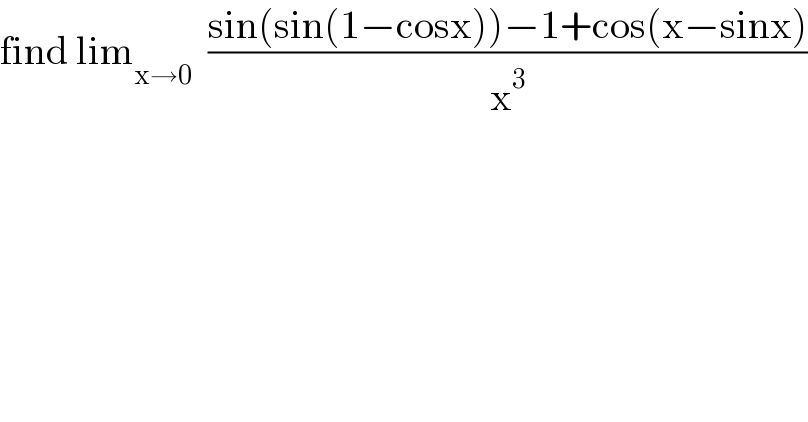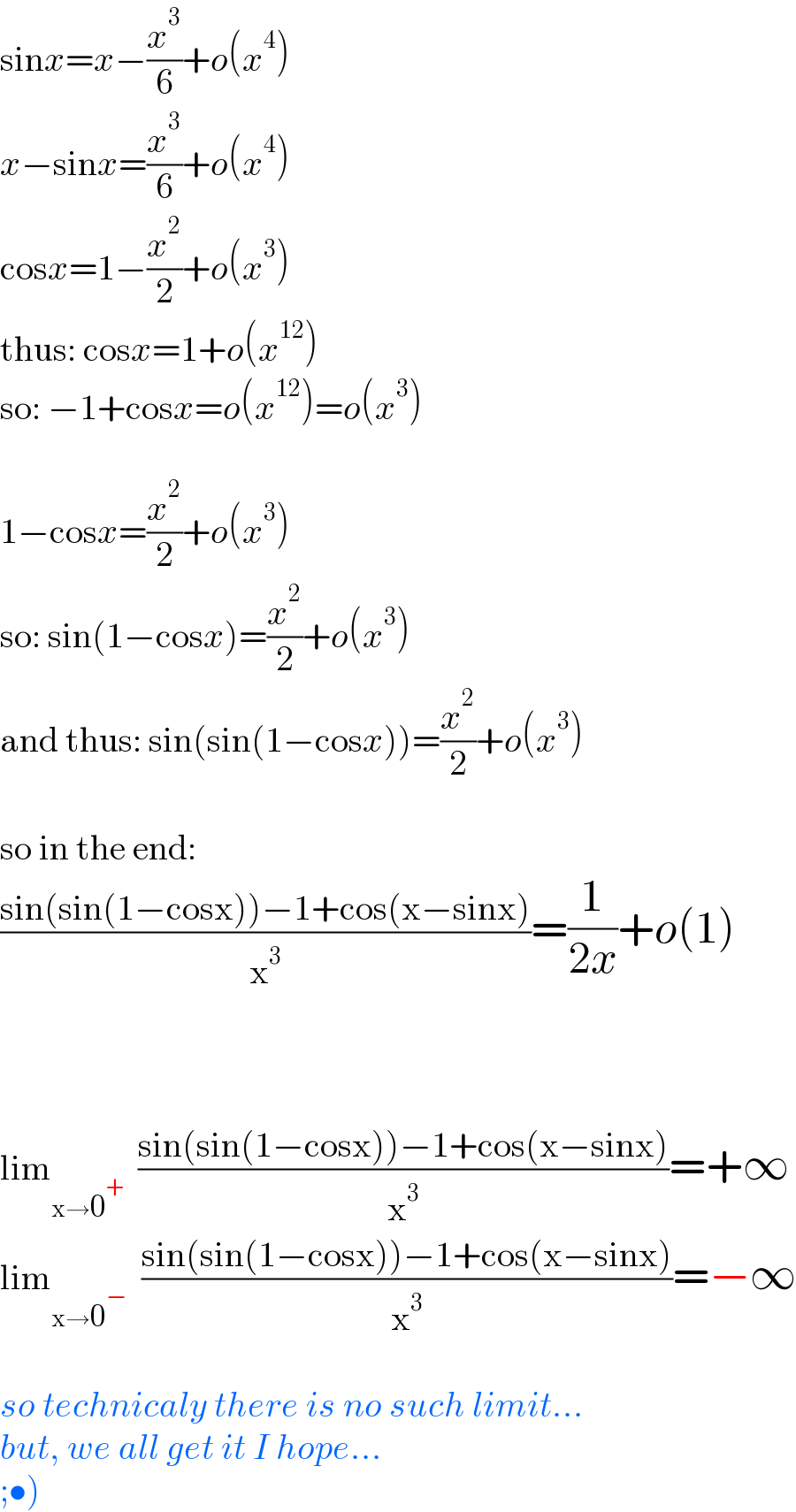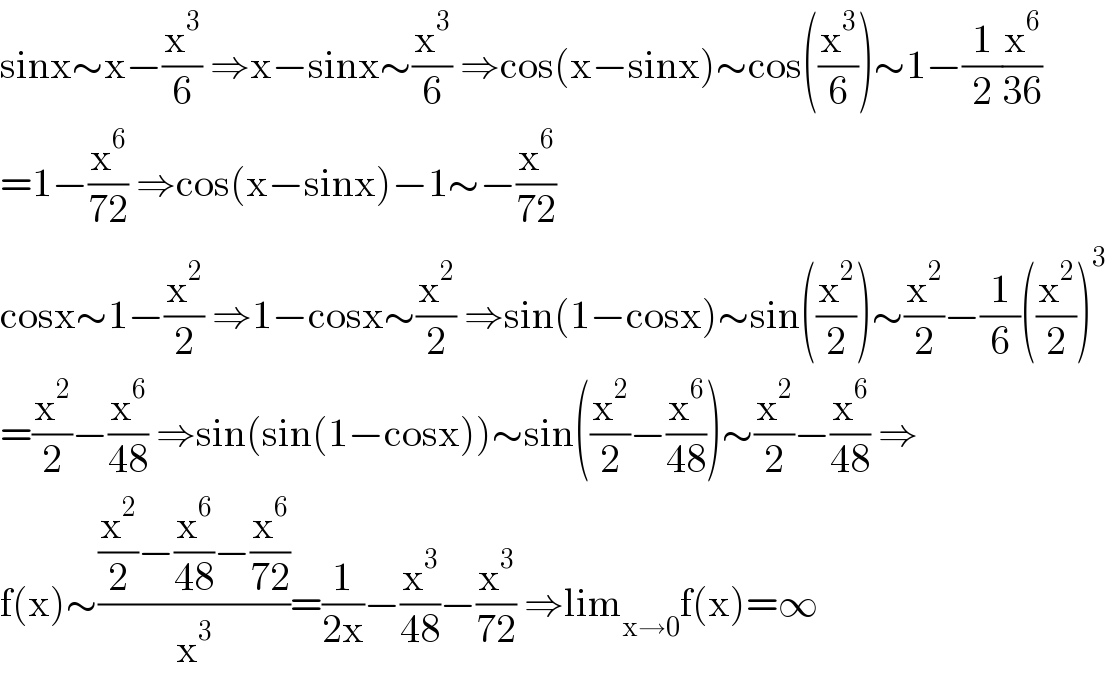Question Number 143730 by mathmax by abdo last updated on 17/Jun/21

$$\mathrm{find}\:\mathrm{lim}_{\mathrm{x}\rightarrow\mathrm{0}} \:\:\frac{\mathrm{sin}\left(\mathrm{sin}\left(\mathrm{1}−\mathrm{cosx}\right)\right)−\mathrm{1}+\mathrm{cos}\left(\mathrm{x}−\mathrm{sinx}\right)}{\mathrm{x}^{\mathrm{3}} } \\ $$
Answered by TheHoneyCat last updated on 17/Jun/21

$$\mathrm{sin}{x}={x}−\frac{{x}^{\mathrm{3}} }{\mathrm{6}}+{o}\left({x}^{\mathrm{4}} \right) \\ $$$${x}−\mathrm{sin}{x}=\frac{{x}^{\mathrm{3}} }{\mathrm{6}}+{o}\left({x}^{\mathrm{4}} \right) \\ $$$$\mathrm{cos}{x}=\mathrm{1}−\frac{{x}^{\mathrm{2}} }{\mathrm{2}}+{o}\left({x}^{\mathrm{3}} \right) \\ $$$$\mathrm{thus}:\:\mathrm{cos}{x}=\mathrm{1}+{o}\left({x}^{\mathrm{12}} \right) \\ $$$$\mathrm{so}:\:−\mathrm{1}+\mathrm{cos}{x}={o}\left({x}^{\mathrm{12}} \right)={o}\left({x}^{\mathrm{3}} \right) \\ $$$$ \\ $$$$\mathrm{1}−\mathrm{cos}{x}=\frac{{x}^{\mathrm{2}} }{\mathrm{2}}+{o}\left({x}^{\mathrm{3}} \right) \\ $$$$\mathrm{so}:\:\mathrm{sin}\left(\mathrm{1}−\mathrm{cos}{x}\right)=\frac{{x}^{\mathrm{2}} }{\mathrm{2}}+{o}\left({x}^{\mathrm{3}} \right) \\ $$$$\mathrm{and}\:\mathrm{thus}:\:\mathrm{sin}\left(\mathrm{sin}\left(\mathrm{1}−\mathrm{cos}{x}\right)\right)=\frac{{x}^{\mathrm{2}} }{\mathrm{2}}+{o}\left({x}^{\mathrm{3}} \right) \\ $$$$ \\ $$$$\mathrm{so}\:\mathrm{in}\:\mathrm{the}\:\mathrm{end}: \\ $$$$\frac{\mathrm{sin}\left(\mathrm{sin}\left(\mathrm{1}−\mathrm{cosx}\right)\right)−\mathrm{1}+\mathrm{cos}\left(\mathrm{x}−\mathrm{sinx}\right)}{\mathrm{x}^{\mathrm{3}} }=\frac{\mathrm{1}}{\mathrm{2}{x}}+{o}\left(\mathrm{1}\right) \\ $$$$ \\ $$$$ \\ $$$$ \\ $$$$\mathrm{lim}_{\mathrm{x}\rightarrow\mathrm{0}^{+} } \:\:\frac{\mathrm{sin}\left(\mathrm{sin}\left(\mathrm{1}−\mathrm{cosx}\right)\right)−\mathrm{1}+\mathrm{cos}\left(\mathrm{x}−\mathrm{sinx}\right)}{\mathrm{x}^{\mathrm{3}} }=+\infty \\ $$$$\mathrm{lim}_{\mathrm{x}\rightarrow\mathrm{0}^{−} } \:\:\frac{\mathrm{sin}\left(\mathrm{sin}\left(\mathrm{1}−\mathrm{cosx}\right)\right)−\mathrm{1}+\mathrm{cos}\left(\mathrm{x}−\mathrm{sinx}\right)}{\mathrm{x}^{\mathrm{3}} }=−\infty \\ $$$$ \\ $$$${so}\:{technicaly}\:{there}\:{is}\:{no}\:{such}\:{limit}… \\ $$$${but},\:{we}\:{all}\:{get}\:{it}\:{I}\:{hope}… \\ $$$$\left.;\bullet\right) \\ $$
Answered by mathmax by abdo last updated on 20/Jun/21

$$\mathrm{sinx}\sim\mathrm{x}−\frac{\mathrm{x}^{\mathrm{3}} }{\mathrm{6}}\:\Rightarrow\mathrm{x}−\mathrm{sinx}\sim\frac{\mathrm{x}^{\mathrm{3}} }{\mathrm{6}}\:\Rightarrow\mathrm{cos}\left(\mathrm{x}−\mathrm{sinx}\right)\sim\mathrm{cos}\left(\frac{\mathrm{x}^{\mathrm{3}} }{\mathrm{6}}\right)\sim\mathrm{1}−\frac{\mathrm{1}}{\mathrm{2}}\frac{\mathrm{x}^{\mathrm{6}} }{\mathrm{36}} \\ $$$$=\mathrm{1}−\frac{\mathrm{x}^{\mathrm{6}} }{\mathrm{72}}\:\Rightarrow\mathrm{cos}\left(\mathrm{x}−\mathrm{sinx}\right)−\mathrm{1}\sim−\frac{\mathrm{x}^{\mathrm{6}} }{\mathrm{72}} \\ $$$$\mathrm{cosx}\sim\mathrm{1}−\frac{\mathrm{x}^{\mathrm{2}} }{\mathrm{2}}\:\Rightarrow\mathrm{1}−\mathrm{cosx}\sim\frac{\mathrm{x}^{\mathrm{2}} }{\mathrm{2}}\:\Rightarrow\mathrm{sin}\left(\mathrm{1}−\mathrm{cosx}\right)\sim\mathrm{sin}\left(\frac{\mathrm{x}^{\mathrm{2}} }{\mathrm{2}}\right)\sim\frac{\mathrm{x}^{\mathrm{2}} }{\mathrm{2}}−\frac{\mathrm{1}}{\mathrm{6}}\left(\frac{\mathrm{x}^{\mathrm{2}} }{\mathrm{2}}\right)^{\mathrm{3}} \\ $$$$=\frac{\mathrm{x}^{\mathrm{2}} }{\mathrm{2}}−\frac{\mathrm{x}^{\mathrm{6}} }{\mathrm{48}}\:\Rightarrow\mathrm{sin}\left(\mathrm{sin}\left(\mathrm{1}−\mathrm{cosx}\right)\right)\sim\mathrm{sin}\left(\frac{\mathrm{x}^{\mathrm{2}} }{\mathrm{2}}−\frac{\mathrm{x}^{\mathrm{6}} }{\mathrm{48}}\right)\sim\frac{\mathrm{x}^{\mathrm{2}} }{\mathrm{2}}−\frac{\mathrm{x}^{\mathrm{6}} }{\mathrm{48}}\:\Rightarrow \\ $$$$\mathrm{f}\left(\mathrm{x}\right)\sim\frac{\frac{\mathrm{x}^{\mathrm{2}} }{\mathrm{2}}−\frac{\mathrm{x}^{\mathrm{6}} }{\mathrm{48}}−\frac{\mathrm{x}^{\mathrm{6}} }{\mathrm{72}}}{\mathrm{x}^{\mathrm{3}} }=\frac{\mathrm{1}}{\mathrm{2x}}−\frac{\mathrm{x}^{\mathrm{3}} }{\mathrm{48}}−\frac{\mathrm{x}^{\mathrm{3}} }{\mathrm{72}}\:\Rightarrow\mathrm{lim}_{\mathrm{x}\rightarrow\mathrm{0}} \mathrm{f}\left(\mathrm{x}\right)=\infty \\ $$
